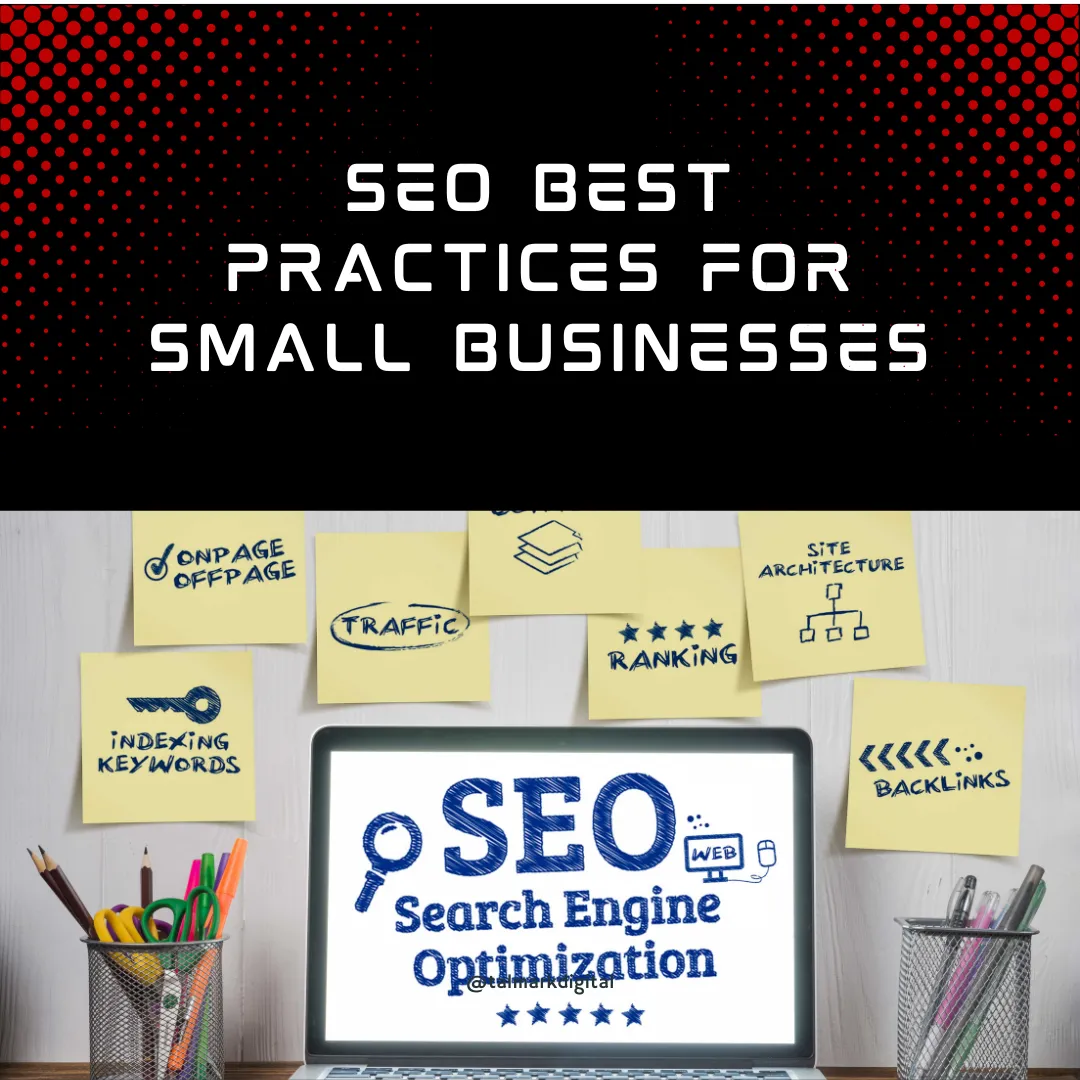Digital Marketing Blog
Digital Marketing Blog
Welcome to the Talmark Digital Blog. Here we will cover everything that helps your organization grow such as sales and marketing best practices, building your online presence, and much more.

SEO Best Practices for Small Businesses
You just launched your beautiful, brand-new website for your business. Congratulations! However, after a few months you notice that you are still not getting any traffic to your new site. What a bummer...
There could be a number of reasons for this, but one of the most common reasons that business owners tend to overlook is Search Engine Optimization.
Search Engine Optimization (SEO) is a crucial component of digital marketing, especially for small businesses aiming to enhance their online visibility. SEO involves optimizing various elements of a website to improve its rankings on search engines like Google. For small businesses, implementing effective SEO strategies can lead to increased organic traffic, higher conversion rates, and ultimately, more sales. In this article, we will delve into SEO best practices that small businesses can implement to improve their search engine rankings and online visibility.
Understanding SEO
So what is SEO exactly? SEO is the practice of optimizing a website to make it more attractive to search engines. Think of a business website without SEO like a billboard in a deserted town. It may have vibrant imagery and compelling messaging, but it’s positioned where few can see it. Just as a billboard needs high traffic locations to be seen and fulfill its purpose, a website needs SEO to be visible to the vast audience available on the internet, ensuring its valuable information reaches and attracts those who are actively looking for it.
The goal is to rank higher in search engine results pages (SERPs) for relevant keywords, making it easier for potential customers to find your business online.
SEO encompasses various aspects, including keyword research, on-page optimization, link building, and content creation.
Keyword Research
Keyword research is absolutely crucial in SEO optimization. It involves identifying the words and phrases that potential customers use to search for products or services similar to yours. Small businesses should focus on finding long-tail keywords, which are more specific and less competitive. Tools like Google Keyword Planner and Ubersuggest can help identify relevant keywords for your business.
The Importance of Long-Tail Keywords
Long-tail keywords are extended, specific phrases or questions that usually have less competition, making them crucial for higher rankings in search engine results pages (SERPs). They are indicative of clear user intent and are more conversion-friendly, especially beneficial for small businesses aiming for cost-effective SEO and PPC campaigns.
For example, let's say you run a digital marketing agency and you are targeting keywords like "digital marketing strategies". You can see that that keyword gets an average monthly search volume of 5000. However, this keyword is highly competitive, with numerous well-established agencies and websites vying for the top spots on the search engine results page (SERP), making it challenging to rank high for this term.
Instead, you could focus on more specific long-tail keywords like “digital marketing strategies for small businesses” or “B2B digital marketing strategies 2023”. These long-tail keywords might have lower search volumes, say around 500 or 1000 searches per month, but they are likely to have less competition, making it easier for your agency to rank higher on SERPs.
Moreover, users searching with these long-tail keywords are likely to be more targeted, having a clearer intent and being more specific in what they are looking for. For instance, a user searching for “digital marketing strategies for e-commerce websites” is likely looking for strategies specifically tailored to e-commerce, and if your agency provides this service, this user is a high-quality lead with a higher probability of conversion.
Additionally, optimizing for long-tail keywords can be more cost-effective, especially in paid search campaigns. The cost per click (CPC) for these specific keywords is generally lower compared to more generic, competitive keywords, allowing you to maximize your advertising ROI.
On-Page Optimization
On-page optimization refers to the process of optimizing individual web pages to rank higher in search engines. This includes optimizing title tags, meta descriptions, headers, and content. Each page should target a specific keyword and include it in the title, headers, and throughout the content. Additionally, optimizing images by using alt tags and compressing file sizes can improve page load speed, a crucial ranking factor.
Quality Content Creation
Content is king in the world of SEO. Creating high-quality, relevant, and informative content is essential for attracting and retaining visitors. Blog posts, articles, and infographics are excellent ways to provide value to your audience while incorporating target keywords. Regularly updating your website with fresh content can also improve your SEO rankings.
Mobile-Friendly Website
With the increasing use of smartphones, having a mobile-friendly website is no longer optional. In fact, in 2021, mobile devices accounted for 63% of all organic search engine visits in the U.S. Therefore, Google uses mobile-first indexing, meaning it primarily uses the mobile version of a site for ranking and indexing. Ensure your website is responsive, meaning it adapts to different screen sizes, and offers a seamless user experience across devices.
User Experience and Site Structure
A well-structured website with clear navigation and internal linking can facilitate quicker crawling and indexing by search engines. Improving user experience by reducing load times, using readable fonts, and creating a visually appealing design can reduce bounce rates and increase time spent on the site, positively impacting SEO rankings.
Link Building
Backlinks, or inbound links from other websites, are a significant ranking factor. They act as votes of confidence, indicating that your content is valuable and reputable. Focus on earning high-quality backlinks from authoritative websites in your industry. Guest posting, creating shareable content, and building relationships with influencers can help acquire valuable backlinks.
Local SEO
For small businesses serving specific geographic areas, local SEO is crucial. Optimize your Google Business Profile listing by providing accurate and consistent contact information, business hours, and categories. Encourage satisfied customers to leave positive reviews and respond to all reviews promptly and professionally. Local SEO also involves optimizing your website for local keywords and creating localized content.
Why Online Reviews Matter
Online reviews are a pivotal and often overlooked component of Local SEO, playing a crucial role in shaping consumer perceptions and influencing purchasing decisions.
Let's pretend that you are in the market for a new blender. You check out Amazon and find two that look almost identical. One has 5 4-star reviews and one has 1000 5-star reviews. Which one are you going to buy?
Not only do they signal a positive reputation to your potential customers, but Google will rank you higher in the search based on the amount of positive reviews you have. Wow!
Social Media Integration
While social media signals are not a direct ranking factor, they can enhance your SEO efforts. Sharing content on social media platforms can increase brand visibility, drive traffic to your website, and potentially earn backlinks. Integrating social media buttons on your website can also encourage visitors to share your content, expanding your reach.
Monitoring and Analytics
Regularly monitoring your SEO efforts is essential for identifying areas of improvement. Use Google Analytics to track website traffic, user behavior, and conversion rates. Monitor your rankings for target keywords and analyze your backlink profile. Based on the insights gained, refine your SEO strategies to continue improving your online presence.
SEO is an ongoing process that requires time, effort, and consistency. Small businesses can leverage SEO best practices to compete with larger companies, reach a wider audience, and achieve sustainable growth. By focusing on keyword research, creating quality content, optimizing on-page elements, building high-quality backlinks, and enhancing user experience, small businesses can significantly improve their search engine rankings and online visibility.
Implementing these SEO best practices can seem daunting, but the rewards in terms of increased organic traffic, higher conversion rates, and enhanced online presence are well worth the effort. By staying informed about the latest SEO trends and continuously optimizing your website, you can ensure that your small business remains competitive in the ever-evolving digital landscape.
Remember, the journey of SEO is one of continuous learning and adaptation. Keep abreast of the latest industry trends, be willing to innovate, and don’t be afraid to take calculated risks. The digital realm offers a level playing field, and with the right strategies, small businesses can outshine their competition and achieve unprecedented success.
Copyright Talmark Digital, LLC 2023 -- All Rights Reserved
We’re on a mission to help businesses scale through the power of technology.


